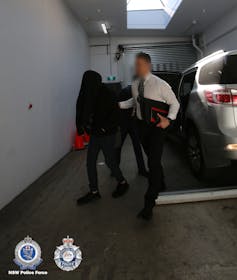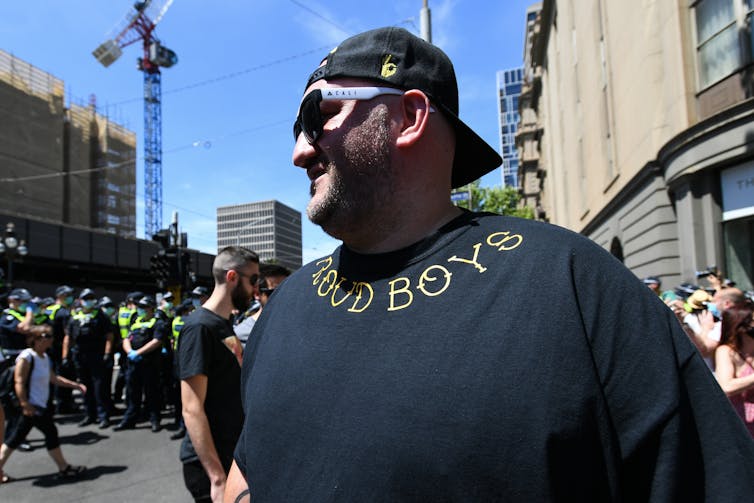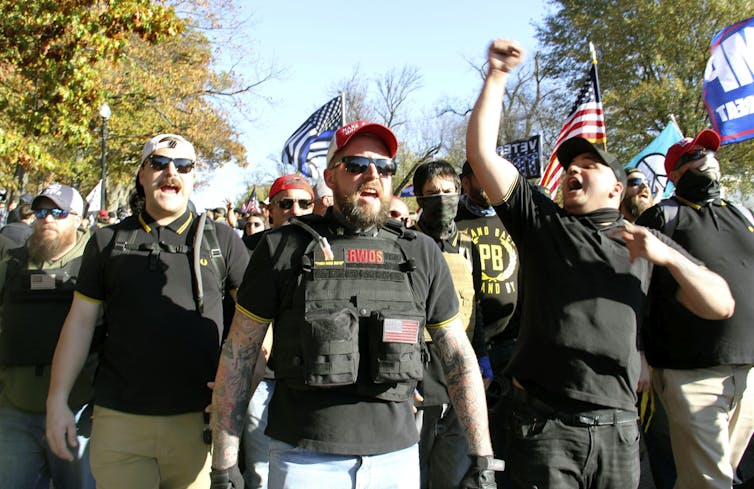Far-right groups have used COVID to expand their footprint in Australia. Here are the ones you need to know about
- Written by Kaz Ross, Lecturer in Humanities (Asian Studies), University of Tasmania
The threat of far-right terrorism has loomed large in Australia this week. An 18-year-old from NSW has been arrested on charges of advocating terrorism and inciting others to violence. According to police, he had not only been sharing white supremacist and neo-Nazi views online, but had expressed support for being involved in a “mass casualty” event.
The arrest coincided with the launch of an inquiry into extremist movements in Australia by the parliamentary joint committee on intelligence and security. Headed by Liberal MP Andrew Hastie, the inquiry will consider both right-wing and left-wing extremism.
 The teenager from Albury arrested this week by the NSW Joint Counter Terrorism Team.
AUSTRALIAN FEDERAL POLICE
The teenager from Albury arrested this week by the NSW Joint Counter Terrorism Team.
AUSTRALIAN FEDERAL POLICE
Also this week, the royal commission report into the Christchurch terrorist attack reported that New Zealand security and intelligence services had mistakenly ignored the potential of far-right groups to commit acts of terrorism due to an overwhelming focus on Islamist threats.
The commissioners confirmed the convicted terrorist behind the attack that killed 51 people had been active in Australian extremist groups before moving to New Zealand.
The far right becoming more visible during pandemic
Far-right extremism is not a new phenomenon in Australia, but it has certainly been on the rise in the past year in response to federal and state governments’ handling of the coronavirus pandemic.
In September, ASIO revealed that up to 40% of its counterterrorism efforts were now directed at far-right extremist activities, an increase from 10-15% before 2016.
ASIO has also warned that far-right groups were exploiting the pandemic to expand their operations. New groups have emerged and existing groups have become more radicalised and increased their memberships.
One such right-wing group is the Proud Boys. They received what seemed like an endorsement this year from US President Donald Trump when, after being asked to condemn white supremacist and militia groups during the first presidential election debate in September, he said they should “stand back and stand by”.
The group has also been growing in Australia this year. Its vetting channel on the encrypted app Telegram has been increasingly active, with a steady stream of new applicants. And members have participated in protests throughout the year.
At the Melbourne Invasion Day rally, a group of Proud Boys posed at Flinders Street Station wearing T-shirts that said “Governor Arthur Phillip did nothing wrong”. They dispersed before the rally commenced.
By November, however, they were bolder and appeared wearing their signature Fred Perry polo shirts at an anti-lockdown protest at Victoria’s Parliament House. They scuffled with police before being pepper-sprayed, arrested and fined.
 The Proud Boys became more of a visible presence at a November protest in Melbourne.
Erik Anderson/AAP
The Proud Boys became more of a visible presence at a November protest in Melbourne.
Erik Anderson/AAP
The Proud Boys are a self-described “Western chauvinist” street-fighting gang for men. They claim to be non-racist, but members must take an oath upholding Western civilisation as supreme. Their process for becoming a member also involves violence against each other and against antifascists or “antifa”.
Read more: Why Australia should be wary of the Proud Boys and their violent, alt-right views
This year, Proud Boys members in America have been arrested for assault, street brawls and weapons offences. They are an increasingly visible presence on the streets there, frequently wearing military body armour and carrying high-powered weapons.
The increased visibility of Proud Boys at demonstrations is concerning if it signals a new strategy by the group to engage in street violence either with police or left-wing protesters.
 Proud Boys members protesting the presidential election outcome in Washington. Note right Wing Death Squad badge.
KYDPL KYODO/AP
Proud Boys members protesting the presidential election outcome in Washington. Note right Wing Death Squad badge.
KYDPL KYODO/AP
Other far-right groups emerging
Other right-wing groups in Australia have benefited from public anger to the government’s coronavirus responses, as well.
Relatively new groups such as the Townsville Free Corps and the National Socialist Network, an offshoot of the Lads Society and incorporating ex-Antipodean Resistance members, have stepped up their recruitment and propaganda activities in Melbourne, Sydney and Queensland over the past year.
The Southern Poverty Law Centre in the US, which tracks far-right extremist groups, revealed in August that the white supremacist terror group The Base had also interviewed potential Australian members using its Perth-based recruiter to set up cells. By late 2019, at least a dozen Australian men had applied to join The Base.
One potential member had been a former political candidate for One Nation, the SPLC reported.
Many of these far-right groups are adherents to the same “great replacement theory” that motivated the Christchurch killer. According to this theory, white Europeans are threatened by increasing non-white immigration and are therefore facing “white genocide”.
Read more: Coronavirus and conspiracies: how the far right is exploiting the pandemic
The Base follows an “accelerationist” ideology, which aims to bring about societal collapse as a way of “winning the race war” for whites.
The National Socialist Network, which has more than 2,000 members on Telegram, uses the “great replacement theory” to recruit. Its leader, Thomas Sewell, specifically targets young, white, “disgruntled” men.
When hateful speech turns into violence
Tyler Jakovac, the 18-year-old man arrested in Albury this week, fits this description. According to NSW police assistant commissioner Mark Walton, he hated anyone who did not look like him and was specifically opposed to Jews, Muslims and immigrants.
The National Socialist Network issued a statement via an encrypted app claiming that Jakovac applied to join six months ago, but didn’t pass the vetting process. The group claims that after being rejected, Jakovac abused it as being “too moderate”.
The Christchurch killer, meanwhile, had been invited to join an earlier version of Sewell’s group. He declined and went on to act alone.
This raises a problem: extremist groups with a public propaganda strategy are easier to identify, but as the inquiry into the Christchurch attack noted, lone actors can be almost invisible to authorities.
Read more: The royal commission report on the Christchurch atrocity is a beginning, not an end
There are communities on gaming platforms, message boards and in encrypted apps that share racist, anti-semitic and hateful material every day. By “"weaponising” irony, users can hide behind plausible deniability (“it’s just a joke”) when challenged about the violence stated in their posts. But to outsiders, the language used can be confronting.
It is often insiders who have a more finely tuned sense of when someone is crossing over from sharing memes to something more sinister. We need to educate and support internet users to follow their hunches by identifying and reporting other users who are edging toward violent action.
The Christchurch murderer was reported to police in 2016 for threatening someone with retribution on the “day of the rope”, according to the inquiry report. This is neo-Nazi shorthand for the mass murder of race traitors. Unfortunately, no police action was taken.
There are thousands of references to the “day of the rope” in online groups — knowing when to step in is the challenge. And, as the events of this week show, disruptive preemptive action is essential to reduce the risk of another mass murder.
Authors: Kaz Ross, Lecturer in Humanities (Asian Studies), University of Tasmania





